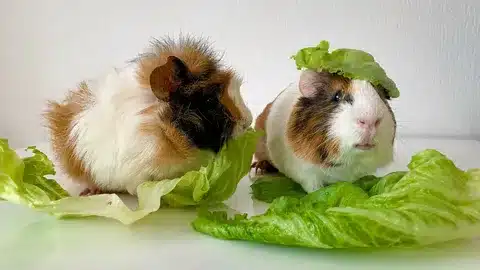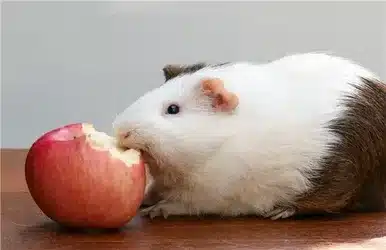Introduction
What Fruits Can Guinea Pigs Not Eat: Exploring the dietary preferences and restrictions of guinea pigs is essential for responsible pet ownership. Guinea pigs have specific nutritional needs, and understanding what fruits they cannot eat is crucial for their health and well-being. In this discussion, we’ll delve into the world of guinea pig nutrition, focusing on fruits that are unsuitable or even harmful to their delicate digestive systems. By identifying these forbidden fruits, we can help guinea pig owners provide a safe and balanced diet, ensuring the longevity and vitality of these beloved pets.
In addition to recognizing what fruits guinea pigs eat, it’s equally important to be aware of the fruits that should be avoided. Guinea pigs have sensitive digestive systems, and certain fruits can be harmful due to their high sugar content, acidity, or other factors that may lead to digestive issues, obesity, or even health problems.
This exploration will provide insights into fruits that should be excluded from a guinea pig’s diet, shedding light on potential risks and alternatives. By making informed choices about their dietary options, guinea pig owners can contribute to the overall health and happiness of their furry companions.

Can guinea pigs eat all fruit?
Fruit works well as an occasional treat that is offered once a day or several times a week. Keep the portion size small since fruit is high in sugar; a small wedge of orange or apple, several blueberries or a thin slice of banana is perfectly adequate. Kiwis, strawberries and citrus have high levels of vitamin C.
Can Guinea Pigs Eat All Fruit
While guinea pigs enjoy fruits as a treat, not all fruits are safe for them to consume. Here are key points to consider:
Sugar Content: Many fruits contain high levels of natural sugars that can be harmful to guinea pigs if consumed in excess. Excessive sugar intake can lead to obesity and digestive problems.
Acidic Fruits: Some fruits, like citrus fruits (oranges, lemons), are acidic and can irritate guinea pigs’ sensitive digestive systems. They should be avoided.
Seeds and Pits: Fruits with seeds or pits, such as cherries and apples, can pose choking hazards and should not be given to guinea pigs.
Moderation: Fruits like apples, pears, and strawberries can be offered in small, occasional portions. These fruits provide essential vitamins and fiber.
Monitoring: Pay attention to how your guinea pig reacts to new fruits. If they experience diarrhea, discomfort, or other adverse reactions, discontinue that fruit immediately.
Variety: It’s essential to maintain a balanced diet for guinea pigs. Fruits should complement their primary diet of hay and fresh vegetables rather than replace them.
What is guinea pigs favorite fruit?
Recommended fruits include: apples, strawberries, blueberries, grapes, and oranges. Fruits and veggies should be fed to guinea pigs in small, bite-sized portions throughout the day (as opposed to all at once).
What Is Guinea Pigs’ Favorite Fruit
Guinea pigs have preferences, but it’s essential to remember that individual tastes may vary among these charming rodents. There isn’t a one-size-fits-all answer to what their favorite fruit is, but some fruits tend to be popular among them:
Sweet Bell Peppers: While technically not a fruit, sweet bell peppers are often a hit with guinea pigs. They enjoy the vibrant colors and sweet taste, making them a delightful addition to their diet.
Apples: Apples, when offered in small, appropriately sized portions (without seeds or core), are a favorite for many guinea pigs due to their sweet and crunchy nature.
Strawberries: Strawberries are another fruit that guinea pigs often enjoy. Their sweet and juicy flesh makes for a tasty treat.
Blueberries: Guinea pigs may also relish the sweet and slightly tart flavor of blueberries. These tiny fruits are a source of antioxidants and can be a healthy choice in moderation.
Oranges: While citrus fruits are generally not recommended due to their acidity, some guinea pigs may enjoy the occasional small piece of orange as a treat.
Can guinea pigs eat papaya?
Guinea pigs can eat papaya, but in moderation! Just like with most fruits, papaya has lots of sugar, so it’s important to make sure that you feed it to them in smaller amounts. There are several benefits and drawbacks to consider before you decide to include it into your guinea pig’s diet!
Can Guinea Pigs Eat Papaya
Papaya is a tropical fruit known for its sweet and juicy flesh, and guinea pigs can eat papaya as an occasional treat. Here are some key considerations when offering papaya to your guinea pig:
Nutritional Benefits: Papaya is a good source of vitamin C, which is essential for guinea pigs since they cannot produce it on their own. This vitamin supports their overall health and immune system.
High Sugar Content: While papaya provides valuable nutrients, it is also relatively high in natural sugars. Feeding it in moderation is crucial to prevent potential health issues, such as obesity or digestive problems.
Small Portions: Offer papaya in small, bite-sized pieces. Remove the seeds and peel before feeding, as the seeds can be hard to digest, and the skin may contain pesticides or contaminants.
Monitor for Reactions: When introducing papaya or any new food to your guinea pig’s diet, monitor their reaction. Some guinea pigs may have sensitivities or allergies, so it’s essential to watch for any adverse effects.
Variety is Key: Papaya should be part of a diverse diet that includes hay, fresh vegetables, and other fruits. Offering a range of foods ensures that your guinea pig gets a well-rounded nutrition.
What shouldn’t guinea pigs eat?
Make sure you do not feed your guinea pigs the following foods (this is not an exhaustive list): cereals; grains; nuts; seeds; dried beans, corn, and peas; buttercups; garden shrubs (such as hemlock or privet); lilies of any kind; sweet peas; nightshade; oak; avocado; onion grass; onions; potato tops; mushrooms; …
What Shouldn’t Guinea Pigs Eat
Guinea pigs have sensitive digestive systems, and it’s crucial to be aware of foods that can be harmful to them. Here are some foods and substances that guinea pigs should avoid:
Citrus Fruits: Citrus fruits like oranges, lemons, and grapefruits are highly acidic and can cause digestive discomfort and mouth sores in guinea pigs. It’s best to steer clear of these fruits.
High-Sugar Fruits: Fruits with high sugar content, such as grapes and bananas, should be given in moderation. Excessive sugar intake can lead to obesity and other health issues.
Seeds and Pits: Seeds and pits found in fruits like apples, cherries, and peaches can pose choking hazards or contain cyanide compounds, which are toxic to guinea pigs.
Human Food Scraps: Guinea pigs should not consume human food leftovers, processed foods, or items high in salt, sugar, or preservatives. These can upset their stomachs and lead to nutritional imbalances.
Dairy Products: Guinea pigs are lactose intolerant, so dairy products like milk, cheese, and yogurt should be avoided as they can cause digestive upset.
Nuts: Nuts are high in fat and can be hard for guinea pigs to digest. They may also pose a choking hazard due to their small size.
Caffeine and Chocolate: Guinea pigs should never consume caffeine or chocolate, as they are toxic to them and can lead to severe health issues.
Can guinea pigs eat tomatoes?
Guinea pigs can eat a variety of fruits and vegetables but it can be difficult to see which are best, safe and healthy. Tomatoes are safe for guinea pigs to eat. Tomatoes have many beneficial dietary benefits including: Great source of fibre – necessary for correct digestive health.
Can Guinea Pigs Eat Tomatoes
Guinea pigs can indeed eat tomatoes, but there are important considerations to keep in mind when offering this fruit as part of their diet:
Nutritional Benefits: Tomatoes are a good source of vitamin C, an essential nutrient for guinea pigs since they cannot produce it on their own. Vitamin C supports their immune system and overall health.
Moderation: While tomatoes are nutritious, they are also relatively high in natural sugars and acidity. As such, they should be offered in moderation to prevent digestive problems and obesity.
Fresh and Ripe: Only provide ripe and fresh tomatoes to your guinea pig. Overripe or spoiled tomatoes can upset their stomach.
Remove Seeds and Green Parts: Before offering tomatoes to your guinea pig, remove the seeds and any green parts (stems or leaves). These contain alkaloids that can be harmful in large quantities.
Monitor Reactions: When introducing tomatoes or any new food into your guinea pig’s diet, monitor their reaction. Some guinea pigs may be sensitive to certain foods, so watch for any adverse effects.
Variety is Key: Tomatoes should be part of a diverse diet that includes hay, fresh vegetables, and other fruits. Offering a range of foods ensures that your guinea pig gets a balanced nutrition.
What food makes guinea pigs happy?
These rodents are big eaters and need to have hay, portions of fresh fruit and vegetables available at all times, particularly those rich in vitamin C, such as celery, carrots, tomatoes, cucumber, spinach and pea pods.
What Food Makes Guinea Pigs Happy
Guinea pigs are herbivores with specific dietary needs, and offering the right foods is essential for their happiness and well-being. Here are some foods that typically make guinea pigs happy:
Fresh Vegetables: Guinea pigs love a variety of fresh, leafy greens and vegetables such as lettuce, spinach, kale, and bell peppers. These provide essential vitamins and minerals while adding excitement to their diet.
Hay: High-quality hay, such as timothy hay or grass hay, is a staple in a guinea pig’s diet. It not only keeps their teeth healthy but also offers them a constant source of nibbling and entertainment.
Fresh Herbs: Herbs like parsley, cilantro, and basil are relished by guinea pigs and add variety to their diet. These can be offered in small amounts as occasional treats.
Fresh Fruits: Guinea pigs enjoy fruits like apples, pears, and strawberries as occasional treats. However, fruits are high in natural sugars, so they should be given sparingly.
Pellets: High-quality guinea pig pellets should be a part of their daily diet. Ensure that the pellets are specifically formulated for guinea pigs and are free of added sugars.
Clean Water: Fresh and clean water is crucial for guinea pigs’ health and happiness. Provide access to clean water at all times.
Enrichment: Providing food puzzles, treat balls, or hiding food in hay can mentally stimulate guinea pigs and make mealtime more engaging.
What is guinea pigs favorite snack?
Most of them love carrots and broccoli, and some love nothing better than fresh grass nibbled from a lawn. Some owners swear by shop-bought treats, but these are not essential, and you should check the ingredients to make sure you’re not feeding the GPs sugar and colorings!
What Is Guinea Pigs’ Favorite Snack
Guinea pigs are not only known for their charming personalities but also for their distinct preferences when it comes to snacks. While individual tastes may vary, certain snacks tend to be favorites among these delightful rodents:
Fresh Leafy Greens: Guinea pigs adore fresh, leafy greens like romaine lettuce, spinach, and kale. These greens are not only tasty but also packed with essential vitamins and minerals.
Bell Peppers: Sweet and crunchy bell peppers, especially the red and green varieties, are often a hit with guinea pigs. They enjoy both the flavor and the satisfying crunch.
Carrots: Carrots, with their slightly sweet taste and satisfying crunch, are commonly enjoyed by guinea pigs. However, they should be offered in moderation due to their sugar content.
Fresh Herbs: Herbs like parsley, cilantro, and basil are relished by guinea pigs and can add variety to their diet. These can be offered as small, occasional treats.
Apples: Guinea pigs may delight in small, seedless apple slices as a sweet and crunchy treat. Be sure to remove the core and seeds.
Timothy Hay: While not a traditional “snack,” high-quality timothy hay is a favorite among guinea pigs. It serves as both a snack and a vital component of their diet, supporting dental health and providing entertainment.
Can guinea pigs eat cucumbers?
Cucumber: Guinea Pigs can eat both the flesh, seeds (not too much) and the skin. Green beans:These contain vitamin C, and can be fed in a raw state. However, be cautious as they also contain calcium and phosphorus. Peas: As with most vegetables, these contain Phosphorus and Calcium.
Can Guinea Pigs Eat Cucumbers
Cucumbers are a hydrating and refreshing treat that many guinea pigs enjoy. Here are some considerations when feeding cucumbers to your furry friends:
Hydration: Cucumbers have a high water content, making them a great choice to help keep guinea pigs hydrated, especially during hot weather.
Nutritional Value: Cucumbers are low in calories and provide vitamins like vitamin K and vitamin C. However, they are not as nutritionally dense as other vegetables, so they should be considered a supplementary snack rather than a primary food source.
Moderation: While cucumbers are generally safe for guinea pigs, they can cause digestive issues if given in excess due to their fiber content. Offer cucumber slices in moderation to avoid upset stomachs.
Skin and Seeds: It’s best to peel cucumbers and remove the seeds before feeding them to guinea pigs. The skin may be waxed, which can be challenging for them to digest, and the seeds can be a choking hazard.
Variety: Cucumbers should be part of a diverse diet that includes hay, fresh vegetables, and other fruits. Offering a range of foods ensures that your guinea pig receives a well-rounded nutrition.

Conclusion
Understanding which fruits guinea pigs should not eat is crucial for their well-being. While guinea pigs can enjoy a variety of fruits as a treat, it’s essential to be aware of the fruits that can be harmful due to high sugar content, acidity, or other factors.
By avoiding fruits like citrus fruits (oranges, lemons), grapes, and fruits with seeds or pits (cherries, apples), guinea pig owners can help prevent potential digestive problems, obesity, and other health issues. Instead, they can focus on providing safer food options, such as small portions of strawberries, blueberries, or melon.
Responsible guinea pig care involves offering a balanced diet that meets their specific nutritional needs, which primarily consist of hay, fresh vegetables, and a limited amount of fruit as an occasional treat. By prioritizing their dietary health, guinea pig owners can ensure their pets lead happy and healthy lives.





No Comments